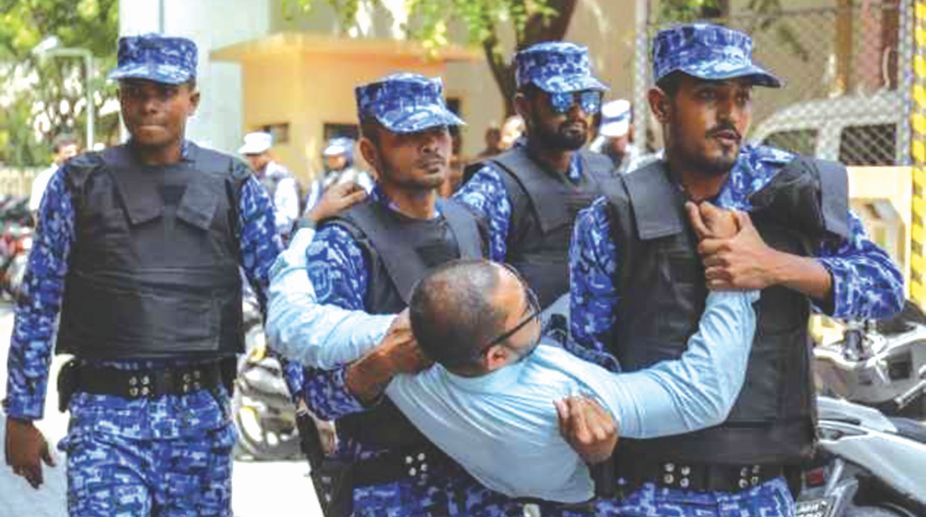At a seminar in the Vivekananda International Foundation last week, the navy chief, Admiral Sunil Lanba stated, “Maldives is a challenge for us. The present government in Maldives is more inclined towards China. The constitution has been tweaked and some islands have been handed over to the Chinese for development. We will have to wait and watch.”
He added that patrolling of the Maldives Exclusive Economic Zone by the Indian navy has re-commenced as also has training of their naval personnel.
Advertisement
India’s ties with Maldives, ideal in the past, nosedived after New Delhi criticised the declaration of an emergency by the present government headed by Abdulla Yameen. In fact, Yameen from the time of becoming president had always favoured a pro-China approach. Presently, 70 per cent of Maldives’ foreign aid flows from China.
While India ignored calls for military action during the emergency, its posturing and attitude pushed the nation closer to China. So strong was the Indian voice and threat of military intervention that Chinese mouth piece Global Times even commented, ‘If India one-sidedly sends troops to the Maldives, China will take action to stop New Delhi.
India should not underestimate China’s opposition to unilateral military intervention.’ India also refused to accept a special envoy of Yameen, sent to justify the coup, pushing the island nation further away.
In Afghanistan, on the other hand, India is the nation the establishment looks up to. While China and Russia are also diplomatically engaged, the country providing maximum economic development and aid is India.
India has also begun providing Afghanistan with military equipment which would increase in the times ahead. The US has been requesting India to do more for economic development in the country, while it continues to employ military power to handle the Taliban. The proximity of India to the Afghan government is well established.
Therefore, India holds the key for a country seeking to enter Afghanistan for economic development, which would subsequently lead the way to enhanced participation in determining the future of the country. Whenever talks take place between the Taliban and the Afghan government, India would be a stakeholder, albeit from behind the scenes. It is this power of India that has angered Pakistan.
It is against this backdrop that in both one-to-one summits of PM Modi with Xi Jinping and Putin the possibility of the two nations independently joining with India in a developmental project in Afghanistan was raised.
Both nations seek to establish footholds in Afghanistan which could bring them into future peace talks. If peace is to return to the country, there would be immense reconstruction, which would open doors for greater involvement. In both cases, India would be the lead nation which would identify the joint project.
Geo-strategically Afghanistan is essential for both China and Russia. It borders China’s restive Xinjiang Province and nations of the Central Asian Republics, all Muslim majority regions. Afghanistan is also fast becoming a base for ISIS fighters, relocating from Syria and Iraq. Neither Russia nor China want them in their own regions.
While both nations maintain direct contact with the Taliban, which they consider the lesser of the two evils, due to this their relations with the Afghan government are undermined. A foothold in the country and a say in its future would benefit both.
Maldives is in India’s backyard. Its proximity to India and its location astride key shipping lanes adds to its geostrategic importance. Maldives moving the Sri Lankan way in providing a permanent base to China would enhance India’s security concerns.
As a member of SAARC, it was the only nation unwilling to support India when it took the decision not to attend the Pakistan meeting in 2016. After the visit of the Pakistani army chief to Maldives a few months ago, there is a likelihood of increased Pak presence in the country, which would add to India’s security concerns.
Indian actions in the recent past, including criticising the present government, have been a reason for its greater proximity to China. This needs to be reversed.
Further, if Indo-China relations of the future are to be maintained on an even keel, and minor border skirmishes ignored for long-term benefits, then the nations need to have greater economic coordination and cooperation. India also needs to move back into the Maldivian economy in a manner that its foothold there is almost permanent.
The ideal option then is for India to seek a pro-quid-pro from China on establishing a major joint venture in the Maldives, akin to what China proposes in Afghanistan. The only difference between the two would be that while India takes the lead in Afghanistan, China takes the lead in Maldives.
The terms and conditions for both must remain the same, ensuring that in either case the second nation, China in Afghanistan and India in Maldives, remain in the fray and are not pushed out, despite change of governments.
Such an action would benefit both nations, beyond just the economic sphere. It would give both a foothold in the nation which has a major geostrategic importance, as also enhance economic and diplomatic cooperation.
This could also act as a cooling factor when tensions rise due to border standoffs. While the host nations, implying Maldives and Afghanistan, need to be taken on board before decisions and investments are done, however, both India and China have their leeway in the countries concerned. A win-win for both nations must be considered and Indian request to China on this must be processed, prior to commencement of a joint project in Afghanistan.
The writer is a retired Major-General of the Indian Army.











